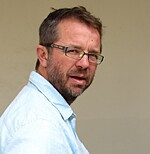The climate crisis is resulting in more severe, frequent, and longer lasting extreme weather events such as heat waves, droughts, flooding, and hurricanes. These events disproportionately impact vulnerable populations around the world. Pregnant women, developing fetuses, and newborns are particularly susceptible to climate change associated adverse health effects. Many reproductive health and birth defects are linked to extreme heat, increased ozone and PM2.5 emissions, and wildfire smoke. Scientists are finding that timing of exposure during critical windows may also play a role in pregnancy outcomes including gestational diabetes, maternal hypertension,preterm birth, low birth weight, and still birth, in addition to birth defects such as congenital anomalies, hypospadias, renal agenesis/hypoplasia, spina bifida, and craniofacial defects. [1] [2] [3] [4]
This is the final webinar in the series, “Generation Chemical: How Environmental Exposures Are Affecting Reproductive Health and Development.” During the webinar, Nathan DeNicola, MD, MSHP, FACOG moderated a discussion between Bruce Bekkar, MD, Matthew Franks Chersich, PhD, Mona Abdo, MPH, and James Crooks, PhD, who presented their research on the linkages between climate change related extreme heat, air pollution, wildfire smoke and reproductive health. They discussed the disproportionate toll these reproductive health effects are taking on minority populations and lower income countries, as well as medical, public health, and policy interventions.
Association of Air Pollution and Heat Exposure With Preterm Birth, Low Birth Weight, and Stillbirth in the US: A Call for Action
The study, Association of Air Pollution and Heat Exposure with Preterm Birth, Low Birth Weight, and Stillbirth in the US, is the first large-scale review of common climate change-related impacts and adverse birth outcomes in the US. Author Bruce Bekkar, MD, highlighted findings from this publication which analyzed data from 68 studies of air pollution and heat and their association with preterm delivery, low birth weight and stillbirth, with a mean of over 560,000 births/study and a total of 32 million births across the country. Although more research is needed, strong evidence suggests that the climate crisis is already harming pregnancies—especially for minority moms—in the US and worldwide. Urgent action is needed, both in protecting individual patients from these harmful exposures and by instituting systems change at all levels of government to complete the transition away from fossil fuel burning. Dr. Bekkar also discussed how health care professionals are uniquely suited to accelerate these needed changes.
Systematic review and meta-analysis of the impacts of extreme heat exposure on maternal, fetal and newborn health outcomes
Vulnerable groups, such as pregnant women and newborns, are especially affected by heat. Physiological changes in pregnancy include dehydration, cardiovascular stress, altered glucose metabolism, raised maternal core temperature, shifts in uterine blood flow and diminished placental function. Impacts of heat exposure on birth outcomes include preterm birth and stillbirths, but extreme heat also disrupts healthcare seeking behaviors, quality of care, and health systems functioning. An increased burden of maternal and newborn complications from extreme heat has major implications for settings where pregnancy is already a high-risk event, especially in Africa with high levels of maternal and perinatal mortality. During this talk Matthew Chersich, PhD, covered the different pathways through which extreme heat affects maternal and newborn health, and evidence for each pathway.
Impact of Wildfire Smoke on Adverse Pregnancy Outcomes in Colorado, 2007-2015
Colorado is regularly impacted by long-range transport of wildfire smoke from upwind regions, which is a major source of ambient PM2.5. Maternal exposure to total PM2.5 during pregnancy has been linked to decreased birth weight and other adverse outcomes, although the impact of wildfire smoke contribution has only recently been investigated. Mona Abdo, MPH, presented results of this study looking at associations between adverse pregnancy outcomes and ambient wildfire smoke PM2.5. Investigators found that exposures to wildfire smoke PM2.5 over the full gestation and during the second trimester were positively associated with pre-term birth, while exposure during the first trimester were associated with decreased birth weight. Ms. Abdo also discussed the importance of developing public health interventions aimed at reducing pregnant women’s exposure to wildfire smoke.
Featured Speakers
 Nathaniel DeNicola, MD, MSHP, FACOG, is a board-certified Ob/Gyn practicing in Washington, DC with Johns Hopkins Health System, and is Chair of Telehealth for the American College of Obstetricians and Gynecologists (ACOG). In this role he serves as the ACOG Mobile and Telehealth expert and leads their current work on innovation – which includes publication of the ACOG Committee Opinion on Telehealth and Telehealth Systematic review in February 2020 Obstetrics & Gynecology.
Nathaniel DeNicola, MD, MSHP, FACOG, is a board-certified Ob/Gyn practicing in Washington, DC with Johns Hopkins Health System, and is Chair of Telehealth for the American College of Obstetricians and Gynecologists (ACOG). In this role he serves as the ACOG Mobile and Telehealth expert and leads their current work on innovation – which includes publication of the ACOG Committee Opinion on Telehealth and Telehealth Systematic review in February 2020 Obstetrics & Gynecology.
He has also served as an expert consultant for national and international medical organizations including the American Academy of Pediatrics (AAP) and the International Federation of Gynecology and Obstetrics (FIGO) on adopting mobile and social media, producing educational material, and implementing best practices in telehealth. He is a published international speaker on the integration of telehealth, mobile and social media into medical practice.
Prior to these current roles he completed the Robert Wood Johnson Clinical Scholars Program (VA) at the University of Pennsylvania, where he also served as Faculty on the Social Media and Health Innovation Lab, and as Senior Fellow at the Leonard Davis Institute on Health Economics. He is a former Merkin Scholar at the Brookings Institution Engelberg Center on Health Care Reform.
Nathaniel completed residency in Obstetrics & Gynecology at Tulane University, earned his medical degree at the University of California, Irvine School of Medicine, and received a Bachelor of Science (Biology) and the University of Notre Dame. Dr. DeNicola can be reached at ndenicola@gmail.com.
 Bruce Bekkar, MD, is a women’s health physician, activist, and international keynote speaker who has been engaged with the climate crisis since 2007. As a full-time activist since 2013, he serves on ecoAmerica’s Climate for Health Leadership Circle Executive Committee, is Chair of the Public Health Advisory Council of the Climate Action Campaign and has worked with non-profits including The Climate Reality Project and the American Lung Association. Bruce has addressed the American Meteorological Society, the U.S. House of Representatives Democratic Caucus, the Royal College of Obstetrics and Gynecology and the International Federation of Gynecology and Obstetrics (FIGO). He is the lead author of the first large-scale review of climate impacts on US pregnancies, published in JAMA Network Open June 18, 2020. Dr. Bekkar can be reached at greendoc@me.com.
Bruce Bekkar, MD, is a women’s health physician, activist, and international keynote speaker who has been engaged with the climate crisis since 2007. As a full-time activist since 2013, he serves on ecoAmerica’s Climate for Health Leadership Circle Executive Committee, is Chair of the Public Health Advisory Council of the Climate Action Campaign and has worked with non-profits including The Climate Reality Project and the American Lung Association. Bruce has addressed the American Meteorological Society, the U.S. House of Representatives Democratic Caucus, the Royal College of Obstetrics and Gynecology and the International Federation of Gynecology and Obstetrics (FIGO). He is the lead author of the first large-scale review of climate impacts on US pregnancies, published in JAMA Network Open June 18, 2020. Dr. Bekkar can be reached at greendoc@me.com.
 Matthew Chersich, PhD, is a Research Professor at the University of the Witwatersrand, South Africa and a Visiting Professor at the University of Ghent, Belgium. My career spans more than 20 years working in medical and public health research in Africa, with a focus on maternal health and HIV, and more recently on climate change and health. My university training encompassed both clinical medicine and public health across three high-ranking universities, and at the Colleges of Medicine in South Africa and the United Kingdom. More recently I spent two years as a visiting student at the Institute of Theology in Assisi, Italy. Overall, I have contributed to 14 WHO guidelines or monologues, with roles spanning guideline writer and reviewer, lead on systematic reviews, lead methodologist overseeing systematic reviews for guidelines and expert committee member. I am a contributing author to the Africa chapter of the 6thIntergovernmental Panel on Climate Change report. My work on climate change has centered on assessing the impacts of climate change on maternal health and HIV, consolidating my experience in the disciplines of clinical medicine, biostatistics, epidemiology and public health. I serve as the lead editor on the climate change section of the journal Globalization, and Health. To date, I have authored more than 175 publications in peer-reviewed journals, with an H-Index of 48. Dr. Chersich can be reached at MChersich@wrhi.ac.za.
Matthew Chersich, PhD, is a Research Professor at the University of the Witwatersrand, South Africa and a Visiting Professor at the University of Ghent, Belgium. My career spans more than 20 years working in medical and public health research in Africa, with a focus on maternal health and HIV, and more recently on climate change and health. My university training encompassed both clinical medicine and public health across three high-ranking universities, and at the Colleges of Medicine in South Africa and the United Kingdom. More recently I spent two years as a visiting student at the Institute of Theology in Assisi, Italy. Overall, I have contributed to 14 WHO guidelines or monologues, with roles spanning guideline writer and reviewer, lead on systematic reviews, lead methodologist overseeing systematic reviews for guidelines and expert committee member. I am a contributing author to the Africa chapter of the 6thIntergovernmental Panel on Climate Change report. My work on climate change has centered on assessing the impacts of climate change on maternal health and HIV, consolidating my experience in the disciplines of clinical medicine, biostatistics, epidemiology and public health. I serve as the lead editor on the climate change section of the journal Globalization, and Health. To date, I have authored more than 175 publications in peer-reviewed journals, with an H-Index of 48. Dr. Chersich can be reached at MChersich@wrhi.ac.za.

Mona Abdo, MPH, is a PhD doctoral candidate at the epidemiology department in the Colorado School of Public Health and a pre-doctoral trainee within the geriatrics department at the Colorado School of Medicine. Her main research focus is on improving the health and quality of life for older adults aging with HIV. Some of her other research has focused on investigating the association between wildfire exposure and adverse pregnancy outcomes. Mona Abdo can be reached at MONA.ABDO@cuanschutz.edu.
 James Crooks, PhD, is an assistant professor at National Jewish Health and a clinical assistant professor at the Colorado School of Public Health. He holds a Ph.D. in physics and a M.S. in statistics from the University of North Carolina at Chapel Hill. Prior to joining the faculty at National Jewish Health he worked for seven years at the U.S. Environmental Protection Agency’s Office of Research and Development. His current research focuses on the health impacts of air pollution, climate-influenced extreme weather events, and environmentally-influenced infectious diseases. Dr. Crooks can be reached at CrooksJ@njhealth.org.
James Crooks, PhD, is an assistant professor at National Jewish Health and a clinical assistant professor at the Colorado School of Public Health. He holds a Ph.D. in physics and a M.S. in statistics from the University of North Carolina at Chapel Hill. Prior to joining the faculty at National Jewish Health he worked for seven years at the U.S. Environmental Protection Agency’s Office of Research and Development. His current research focuses on the health impacts of air pollution, climate-influenced extreme weather events, and environmentally-influenced infectious diseases. Dr. Crooks can be reached at CrooksJ@njhealth.org.
The webinar series is brought to you in partnership with the Collaborative on Health and the Environment, the University of California, San Francisco Program on Reproductive Health and the Environment (PRHE), the International Federation of Gynecology and Obstetrics (FIGO), Alliance of Nurses for Healthy Environments (ANHE), Endocrine Society, the International Federation of Fertility Societies (IFFS), and UCSF’s Environment Research and Translation for Health Center (EaRTH).
This webinar was moderated by Nathaniel DeNicola, MD, MSHP, FACOG, Chair of Telehealth for the American College of Obstetricians and Gynecologists (ACOG). It lasted for 70 minutes and was recorded for our call and webinar archive.
